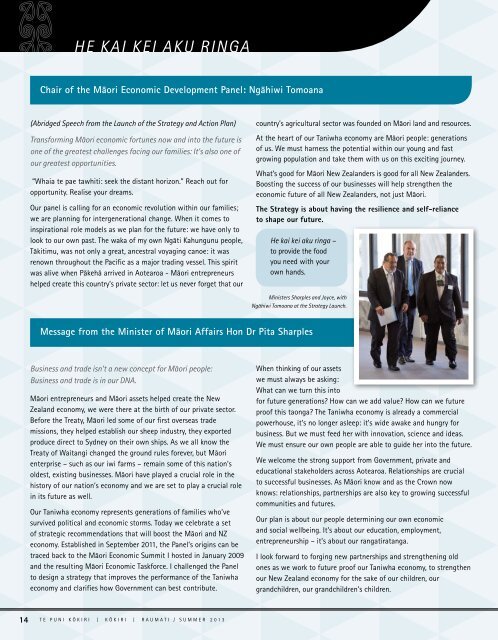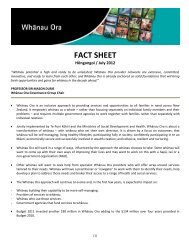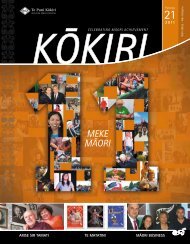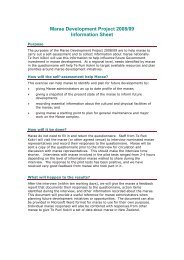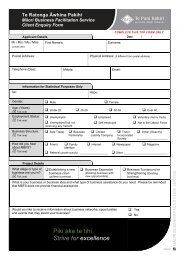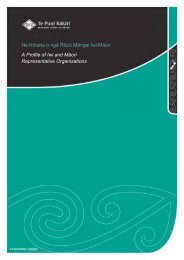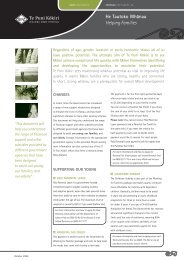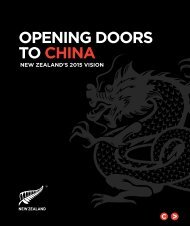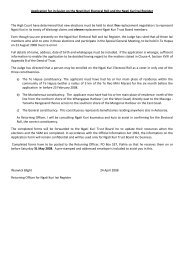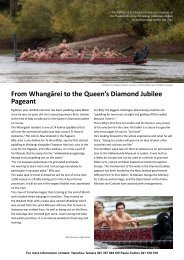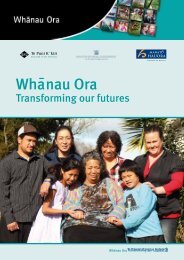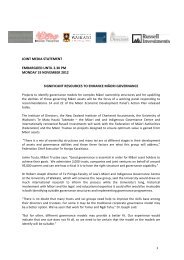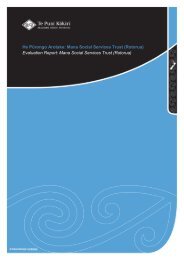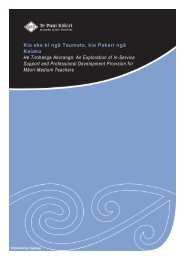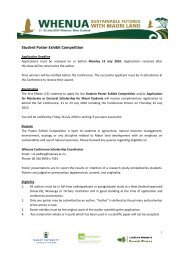Download the PDF (5.1MB) - Te Puni Kokiri
Download the PDF (5.1MB) - Te Puni Kokiri
Download the PDF (5.1MB) - Te Puni Kokiri
You also want an ePaper? Increase the reach of your titles
YUMPU automatically turns print PDFs into web optimized ePapers that Google loves.
HE KAI KEI AKU RINGA<br />
Chair of <strong>the</strong> Mäori Economic Development Panel: Ngähiwi Tomoana<br />
(Abridged Speech from <strong>the</strong> Launch of <strong>the</strong> Strategy and Action Plan)<br />
Transforming Mäori economic fortunes now and into <strong>the</strong> future is<br />
one of <strong>the</strong> greatest challenges facing our families: It’s also one of<br />
our greatest opportunities.<br />
“Whaia te pae tawhiti: seek <strong>the</strong> distant horizon.” Reach out for<br />
opportunity. Realise your dreams.<br />
Our panel is calling for an economic revolution within our families;<br />
we are planning for intergenerational change. When it comes to<br />
inspirational role models as we plan for <strong>the</strong> future: we have only to<br />
look to our own past. The waka of my own Ngäti Kahungunu people,<br />
Täkitimu, was not only a great, ancestral voyaging canoe: it was<br />
renown throughout <strong>the</strong> Pacific as a major trading vessel. This spirit<br />
was alive when Päkehä arrived in Aotearoa - Mäori entrepreneurs<br />
helped create this country’s private sector: let us never forget that our<br />
country’s agricultural sector was founded on Mäori land and resources.<br />
At <strong>the</strong> heart of our Taniwha economy are Mäori people: generations<br />
of us. We must harness <strong>the</strong> potential within our young and fast<br />
growing population and take <strong>the</strong>m with us on this exciting journey.<br />
What’s good for Mäori New Zealanders is good for all New Zealanders.<br />
Boosting <strong>the</strong> success of our businesses will help streng<strong>the</strong>n <strong>the</strong><br />
economic future of all New Zealanders, not just Mäori.<br />
The Strategy is about having <strong>the</strong> resilience and self-reliance<br />
to shape our future.<br />
He kai kei aku ringa –<br />
to provide <strong>the</strong> food<br />
you need with your<br />
own hands.<br />
Ministers Sharples and Joyce, with<br />
Ngähiwi Tomoana at <strong>the</strong> Strategy Launch.<br />
Message from <strong>the</strong> Minister of Mäori Affairs Hon Dr Pita Sharples<br />
Business and trade isn’t a new concept for Mäori people:<br />
Business and trade is in our DNA.<br />
Mäori entrepreneurs and Mäori assets helped create <strong>the</strong> New<br />
Zealand economy, we were <strong>the</strong>re at <strong>the</strong> birth of our private sector.<br />
Before <strong>the</strong> Treaty, Mäori led some of our first overseas trade<br />
missions, <strong>the</strong>y helped establish our sheep industry, <strong>the</strong>y exported<br />
produce direct to Sydney on <strong>the</strong>ir own ships. As we all know <strong>the</strong><br />
Treaty of Waitangi changed <strong>the</strong> ground rules forever, but Mäori<br />
enterprise – such as our iwi farms – remain some of this nation’s<br />
oldest, existing businesses. Mäori have played a crucial role in <strong>the</strong><br />
history of our nation’s economy and we are set to play a crucial role<br />
in its future as well.<br />
Our Taniwha economy represents generations of families who’ve<br />
survived political and economic storms. Today we celebrate a set<br />
of strategic recommendations that will boost <strong>the</strong> Mäori and NZ<br />
economy. Established in September 2011, <strong>the</strong> Panel’s origins can be<br />
traced back to <strong>the</strong> Mäori Economic Summit I hosted in January 2009<br />
and <strong>the</strong> resulting Mäori Economic Taskforce. I challenged <strong>the</strong> Panel<br />
to design a strategy that improves <strong>the</strong> performance of <strong>the</strong> Taniwha<br />
economy and clarifies how Government can best contribute.<br />
When thinking of our assets<br />
we must always be asking:<br />
What can we turn this into<br />
for future generations? How can we add value? How can we future<br />
proof this taonga? The Taniwha economy is already a commercial<br />
powerhouse, it’s no longer asleep: it’s wide awake and hungry for<br />
business. But we must feed her with innovation, science and ideas.<br />
We must ensure our own people are able to guide her into <strong>the</strong> future.<br />
We welcome <strong>the</strong> strong support from Government, private and<br />
educational stakeholders across Aotearoa. Relationships are crucial<br />
to successful businesses. As Mäori know and as <strong>the</strong> Crown now<br />
knows: relationships, partnerships are also key to growing successful<br />
communities and futures.<br />
Our plan is about our people determining our own economic<br />
and social wellbeing. It’s about our education, employment,<br />
entrepreneurship – it’s about our rangatiratanga.<br />
I look forward to forging new partnerships and streng<strong>the</strong>ning old<br />
ones as we work to future proof our Taniwha economy, to streng<strong>the</strong>n<br />
our New Zealand economy for <strong>the</strong> sake of our children, our<br />
grandchildren, our grandchildren’s children.<br />
14<br />
T E P U N I K ö K I R I | K ö K I R I | R A U M A T I / S U M M E R 2 0 1 3


